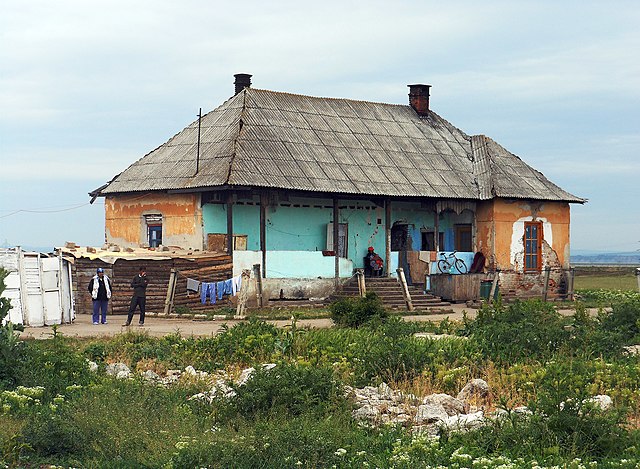Pentecostal Union of Romania
The Pentecostal Union of Romania or the Apostolic Church of God is Romania's fourth-largest religious body and one of its eighteen officially recognised religious denominations. At the 2021 census, some 404,000 Romanians declared themselves to be Pentecostals. Ethnically, as of 2002, they were 85.2% Romanians, 10.6% Roma, 1.9% Ukrainians, 1.8% Hungarians and 0.5% belonged to other groups. They have 1,343 churches, 7,879 affiliates and 354 pastors, along with strong lay leadership. The denomination originates in the early 1920s and, headed by a central leadership, is divided into nine regional communities: Arad, Braşov, Bucharest, Cluj-Napoca, Constanţa, Oradea, Oltenia-Argeş (Craiova), Maramureş-Sătmar and Suceava. Membership is concentrated in Crişana, Banat and northern Moldavia.
A Pentecostal church in Dej.
Roma, traditionally Țigani, constitute one of Romania's largest minorities. According to the 2011 census, their number was 621,573 people or 3.3% of the total population, being the second-largest ethnic minority in Romania after Hungarians. There are different estimates about the size of the total population of people with Romani ancestry in Romania, varying from 4.6 per cent to over 10 percent of the population, because many people of Romani descent do not declare themselves Roma.
For example, in 2007 the Council of Europe estimated that approximately 1.85 million Roma lived in Romania, based on an average between the lowest estimate and the highest estimate available at the time. This figure is equivalent to 8.32% of the population.
Roma village in Romania after the abolition of slavery, 1884
Picture of a house which is home to a Gypsy family.
A Roma family travelling by wagon
A Roma couple





